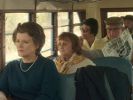Eye For Film >> Movies >> Hannah Arendt (2012) Film Review
Margarethe von Trotta's heartfelt Hannah Arendt begins with the arrest of Adolf Eichmann, the former chief of the Gestapo's Jewish Office, at night, on a country road in Argentina in May 1960. A flashlight segues into the lighter Arendt uses to light a cigarette. Barbara Sukowa plays Arendt, "the thinker," with so much finesse and tough delicacy that the cigarettes she smokes in almost every scene are clearly not needed as a crutch for the actress, or to give her something to do while reflecting.
Sukowa's Arendt speaks English with an exaggerated accent that is difficult to understand at the start, when chips become ships. Her friends, who gather several times during the movie in the apartment she shares with her husband Heinrich Blücher (Axel Milberg, with fabulous off-beat charm) on Riverside Drive, New York, make fun of her for it, especially friend Mary McCarthy.

Janet McTeer plays the novelist like a racehorse ready to act and never given the chance. She has to be the chatty girlfriend who joins in games of billiards and discusses man trouble. The scenes on their own don't ring true because they deserve more sensitivity. McTeer's McCarthy could join her Vassar friend Elizabeth Bishop in Bruno Barreto's intricate Reaching For The Moon, and take Hannah along for a week of vacation in Brazil.
Arendt's old friend and later colleague at the University in Exile, the New School's graduate division, in New York City, Hans Jonas, like her, a student of Heidegger and Husserl, is played as a spirited combatant by Ulrich Noethen, who seems to have not aged since starring in Joseph Vilsmaier's Harmonists in 1997.
Von Trotta's film focuses on the years surrounding the Eichmann trial in Israel in 1961, which Arendt covered as a reporter for The New Yorker. The five articles she published in 1963, reprinted in book form as Eichmann in Jerusalem, caused great controversy. Arendt's criticism that the Israeli government and the prosecutor put on a show trial, that Jewish leaders facilitated the deportations, and the concept of the "banality of evil" shook the world and is shown adeptly in the film.
Arendt's work is interdisciplinary. Psychoanalyst and linguist Julia Kristeva, who wrote an intellectual biography about Arendt's genius, asked, "Is it philosophy? political science? sociology?"
Flashbacks explain the young Arendt's affair with philosopher Martin Heidegger, her former professor, who taught her "to think" and whom she visits again in the 1950s, despite his past involvement with the Nazis. The information is put forth through images. Besides making Heidegger look creepy, they do little to further the plot or explain Arendt's thinking.
Sukowa and Milberg have a great rapport and the scenes showing the couple in their apartment, going about their lives, moving around the endless stacks of paper that contain the transcript of the Eichmann trial, discussing intellectual concepts, are effective, illuminating and poised. The critiques in the office of The New Yorker, even before she hands anything in, are the most cartoonish, and I don't mean a New Yorker cartoon.
A good decision von Trotta makes, is to use the actual footage of the trial and not have an actor play Adolf Eichmann. She does not try to blend the two levels, but has Sukowa, smoking and typing, mostly in the press room, react to the real thing in black and white on a monitor.
With her friends in Jerusalem, Arendt discusses her reactions to the man who is so different from what she imagined. They quote Tasso and Faust and because "Eichmann is no Mephisto," she questions how this "childish bureaucrat" abandoned his personal conscience.
"Radical evil has nothing to do with selfishness." She explains how Eichmann was "blown into history - he was simply unable to think." Arendt deserves to be rediscovered by a film audience. Called cruel and ruthless by a dying friend, Arendt's complex perceptions are as timely and important now as they were when she first published them in the Sixties.
Obeying orders and defending a right to act without conscience did not end in 1945. "The greatest evil is the one committed by nobodies, by human beings who refuse to be people," she says in the film, "he [Eichmann] surrendered the ability to think." Observing Eichmann, who possessed the "horrible gift for consoling himself with clichés" gave Arendt the opportunity to explain the connection of language and conscience. Her use of "banality", the film makes very clear, must not be mistaken for innocence. Evil hides in plain sight.
When "the chips are down", Hannah Arendt wants you to remember, "only good can be profound and radical".
Reviewed on: 27 May 2013



















